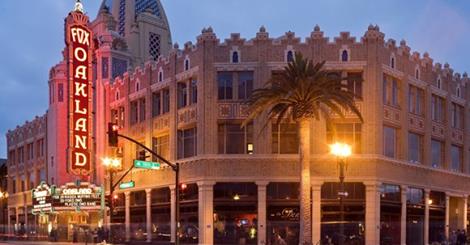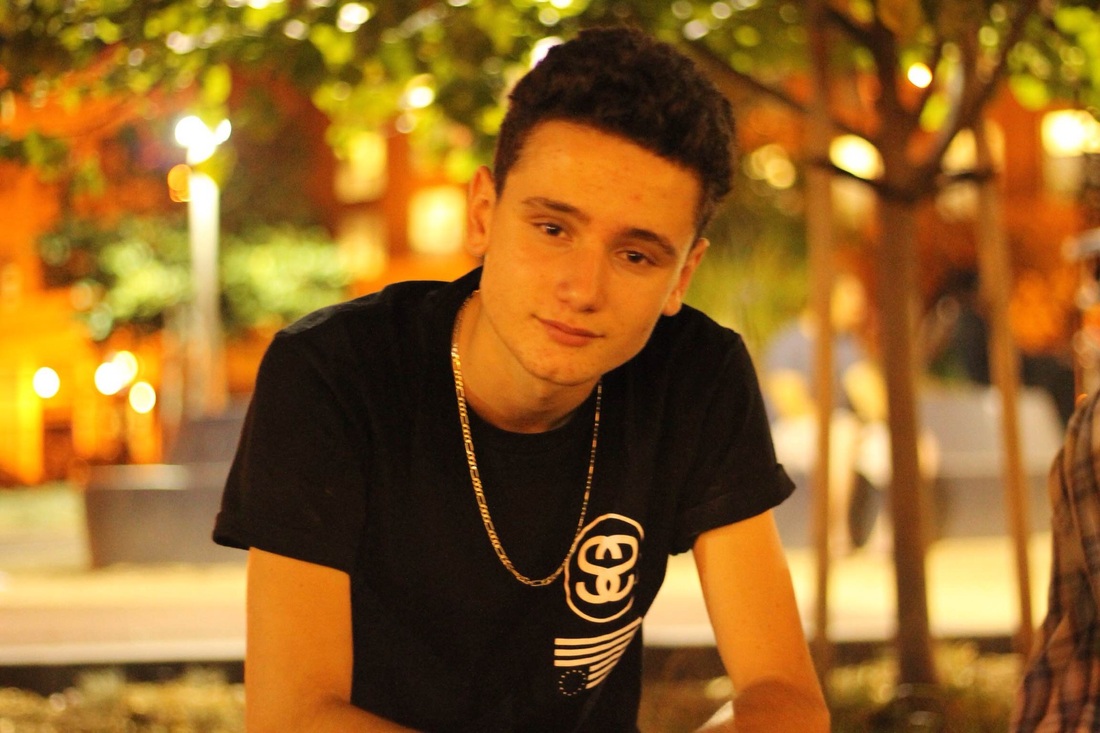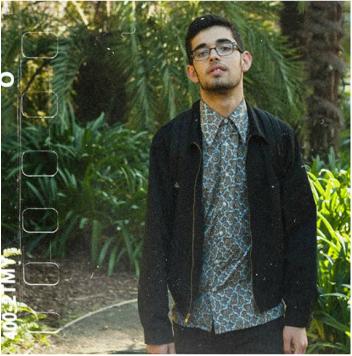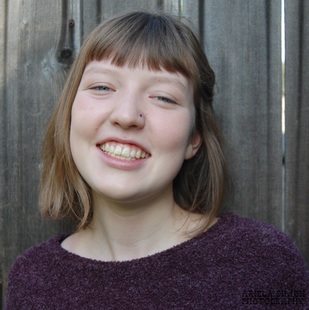As a high school student at Oakland School for the Arts who's in a high energy rock band, I know what it’s like to try to balance school with music. Managing school work and time with my band is not always a walk in the park. What I soon came to realize was that I wasn’t the only one. There are tons of OSA students balancing school work with extracurricular activities. What surprised me most was the amount of people at OSA that do productive arts outside of the school that have no direct contact to their emphasis. I interviewed four OSA students in different emphases such as Instrumental, Digital Media, Theatre, and Literary and got the inside scoop on what it’s like to multitask all the creativity.
The first person that came to mind to interview was my good friend Ben Schecter. Ben is a member of the Theatre Department here at OSA, but outside of school he is an aspiring rapper. I had to interview Ben as he tried on costumes for the Ohlone Theatre festival which really drew me into what his life must be like, hectic, but worth it. Being truly enveloped in the works of what Ben had going on made me feel right at home since I was pretty much doing the same thing, except with Literary. I was interested in finding out how the difference between Theatre and Music worked for him and maybe if they have any similarities.
The first person that came to mind to interview was my good friend Ben Schecter. Ben is a member of the Theatre Department here at OSA, but outside of school he is an aspiring rapper. I had to interview Ben as he tried on costumes for the Ohlone Theatre festival which really drew me into what his life must be like, hectic, but worth it. Being truly enveloped in the works of what Ben had going on made me feel right at home since I was pretty much doing the same thing, except with Literary. I was interested in finding out how the difference between Theatre and Music worked for him and maybe if they have any similarities.
So,how do you manage time with what you do outside of school and work at OSA?
It’s not very easy. I have a lot of rehearsals and I also have studio time a lot, just recently I started working with a manager and I’ve been having actual studio time having deadlines and all that kind of stuff. So it’s been hard especially with my social life, but it’s worth it cause I get to do what I really want to do.
How would you describe the relationship you have between your emphasis and what you do outside of school?
I mean, people in theatre, I mean maybe the kids do, but I don’t think the teachers know that I rap. Mr.Berry [Ben's Theatre teacher] actually liked my music on Facebook, which is really uncomfortable. I kinda keep them pretty seperate, I think that modern day hip hop isn’t really comfortable with theatre. It’s like very separate genres. They’re both similar expression wise, but the way we express our self in theatre is very different than rap.
How so?
It’s just different cultures, you know? It’s like a different language, a different audience, a different demographic. Kids our age don’t really go and see plays which is a shame because plays are awesome. You can learn a lot about humans from going to plays, but it’s sad because it’s kind of like a kiss ass thing to do. When really it’s beautiful and I think that that’s the biggest difference. One is really culturally acceptable and one is kinda not really dealt with. If you do theatre you’re considered a nerd, and I’m fasho not a nerd.
Do you feel like your emphasis plays into what you do outside of school? Or vice versa?
No.
Not at all?
I keep them very separate.
Have you learned anything here at OSA that has helped you with your music, or anything you've done in your music that’s helped you at OSA?
Yes, definitely. Stage presence, breath control, spinal alignment. Which sounds like it wouldn’t really have anything to do with music, but when you’re on stage- I mean in that sense music and theatre are very similar because when you’re on stage, you have to have a presence, exert energy, and make people see you. If you’re standing there and your chest is caved in and you’re uncomfortable in your body, then people aren't gonna listen to you. So we've worked a lot this year with the Alexander method, he’s an acting practitioner who focused on the alignment of the spine and making your body a blank canvas so you could dive into a character. The blank canvas is a beautiful thing, it’s upright, your head is lifted, it’s kind of regal, and nothing looks better on stage than somebody who walks out with presence.
So how do you manage time wise? I mean it must be pretty hard if you have a lot of-
I don’t manage my time, it’s pretty rough. Well that’s not true, I don’t get to see my girlfriend, which she’s bummed about. I’m in rehearsals for New works, I was just cast in a short film, I’m in Peter and Wendy which is the Edinboro show, I’m in Ohlone, I’m working on getting performances at clubs, I’m recording a mixtape, single, and music video (watch out for that). Also I have school work, I’m a pretty good student I have like a 3.80, so I just prioritize. To be honest I prioritize my music over everything else because I see that as the most viable career path, but I make sure that everything else is done as well because it’s really important to me to have a balance in my life and not let one craft take over the other.
Do you feel like OSA has helped you strive in what you do outside of school or vice versa?
I met my producer, and like my best friend, my brother at OSA [producer Mingu*] and he’s helped me go leaps and bounds. He taught me how to really record and do all that. I also met my friend Dylan who got me serious about rapping. All the major connections I’ve made in regards to music have been at OSA.
It’s not very easy. I have a lot of rehearsals and I also have studio time a lot, just recently I started working with a manager and I’ve been having actual studio time having deadlines and all that kind of stuff. So it’s been hard especially with my social life, but it’s worth it cause I get to do what I really want to do.
How would you describe the relationship you have between your emphasis and what you do outside of school?
I mean, people in theatre, I mean maybe the kids do, but I don’t think the teachers know that I rap. Mr.Berry [Ben's Theatre teacher] actually liked my music on Facebook, which is really uncomfortable. I kinda keep them pretty seperate, I think that modern day hip hop isn’t really comfortable with theatre. It’s like very separate genres. They’re both similar expression wise, but the way we express our self in theatre is very different than rap.
How so?
It’s just different cultures, you know? It’s like a different language, a different audience, a different demographic. Kids our age don’t really go and see plays which is a shame because plays are awesome. You can learn a lot about humans from going to plays, but it’s sad because it’s kind of like a kiss ass thing to do. When really it’s beautiful and I think that that’s the biggest difference. One is really culturally acceptable and one is kinda not really dealt with. If you do theatre you’re considered a nerd, and I’m fasho not a nerd.
Do you feel like your emphasis plays into what you do outside of school? Or vice versa?
No.
Not at all?
I keep them very separate.
Have you learned anything here at OSA that has helped you with your music, or anything you've done in your music that’s helped you at OSA?
Yes, definitely. Stage presence, breath control, spinal alignment. Which sounds like it wouldn’t really have anything to do with music, but when you’re on stage- I mean in that sense music and theatre are very similar because when you’re on stage, you have to have a presence, exert energy, and make people see you. If you’re standing there and your chest is caved in and you’re uncomfortable in your body, then people aren't gonna listen to you. So we've worked a lot this year with the Alexander method, he’s an acting practitioner who focused on the alignment of the spine and making your body a blank canvas so you could dive into a character. The blank canvas is a beautiful thing, it’s upright, your head is lifted, it’s kind of regal, and nothing looks better on stage than somebody who walks out with presence.
So how do you manage time wise? I mean it must be pretty hard if you have a lot of-
I don’t manage my time, it’s pretty rough. Well that’s not true, I don’t get to see my girlfriend, which she’s bummed about. I’m in rehearsals for New works, I was just cast in a short film, I’m in Peter and Wendy which is the Edinboro show, I’m in Ohlone, I’m working on getting performances at clubs, I’m recording a mixtape, single, and music video (watch out for that). Also I have school work, I’m a pretty good student I have like a 3.80, so I just prioritize. To be honest I prioritize my music over everything else because I see that as the most viable career path, but I make sure that everything else is done as well because it’s really important to me to have a balance in my life and not let one craft take over the other.
Do you feel like OSA has helped you strive in what you do outside of school or vice versa?
I met my producer, and like my best friend, my brother at OSA [producer Mingu*] and he’s helped me go leaps and bounds. He taught me how to really record and do all that. I also met my friend Dylan who got me serious about rapping. All the major connections I’ve made in regards to music have been at OSA.
Ari is another person who really inspires me as musical multitasker. The only difference is that his emphasis directly connects to what he does outside of school.
| State your Name/Age/Emphasis Ari Carpenter. 16 years old (Sophomore). Instrumental. What do you do outside of OSA? I am a music producer for myself and other artists. I also do engineering and sound stuff for people and I intern at a recording studio. |
How would you describe the relationship you have between your emphasis and what you do outside of school?
It’s a very closely knit relationship, because pretty much every musical thing I learn can be cross implemented with music production and or engineering. It’s a whole lot of fun because it all has to revolve around music and listening to it and making it.
Have you learned anything at OSA that plays into what you do outside of OSA or vice versa?
OSA gave me a good understanding of music theory, it all feeds and works together, it’s all very similar.
How has music theory helped you with doing stuff outside of school?
With music production It helps me understand how chords work and how to almost create a mood using musical notes and making it feel like it’s going somewhere. I’ve learned a lot about orchestration and arrangement and even accompaniment. Instrumental relationships. The hot stuff.
Do you feel like being at OSA has helped you strive in what you do outside of school?
It’s definitely helped me be inspired and it allows me a place to practice everything in very unique ways and be surrounded by people that have a similar interest. Yes. It’s very nice.
It’s a very closely knit relationship, because pretty much every musical thing I learn can be cross implemented with music production and or engineering. It’s a whole lot of fun because it all has to revolve around music and listening to it and making it.
Have you learned anything at OSA that plays into what you do outside of OSA or vice versa?
OSA gave me a good understanding of music theory, it all feeds and works together, it’s all very similar.
How has music theory helped you with doing stuff outside of school?
With music production It helps me understand how chords work and how to almost create a mood using musical notes and making it feel like it’s going somewhere. I’ve learned a lot about orchestration and arrangement and even accompaniment. Instrumental relationships. The hot stuff.
Do you feel like being at OSA has helped you strive in what you do outside of school?
It’s definitely helped me be inspired and it allows me a place to practice everything in very unique ways and be surrounded by people that have a similar interest. Yes. It’s very nice.
Awana has been doing this for a while now and since she’s a senior I figured she’s really mastered the art of juggling her art and academics.
What do you do outside of OSA? What is the productive thing you do outside of OSA?
Productive things that I do outside of OSA is: I make short films, I do internships with Indigo Moment Photography, where I practice my art and that’s basically what I do. I work for a really great photographer that works in Danville (Indigo Moment Photography) and I work with her a lot. I do a lot of events such as like weddings, High school reunions, and a bunch of like, cute stuff and I get paid for that so, that’s super awesome. Then I just make short films with my friends.
How do you manage time with what you do outside of OSA with school and the work that you have outside of school?
Sometimes working does interfere with school, but the thing about digital media is we have an early release form for filming, for projects and stuff. So whenever I’m doing a wedding or a project with my boss, I’ll get a early release from and then it works out fine, and then I’ll just go home and get my homework from the Digital Media blog so it doesn’t really create a super big problem.
Is it ever really stressful trying to get your work done and then also trying to work efficiently and be as professional as possible?
I would say yes, and no. Yes because school, a lot of people forget that Oakland School for the Arts does have academic classes, and even though it’s not apart of my art, it’s still school it still is a part of art here. For me to do my art, for me to have my art be shown at the shows, I have to be passing my classes. So I think it interferes when I’m doing more working than school work I guess you can say. When I have a lot of stuff that I’m getting paid for that needs to be done v.s when it’s school work , it’s kinda that big bleh.
Have you learned anything here at OSA that has really helped you set a foundation for what you do outside of school? Anything you’ve learned that’s really helped you, anything that’s made you go “Oh man I’m so grateful for OSA… If I wouldn’t have learned that then…”
The skills that I’ve learned in Digital Media are directing, screenwriting, coding, which I’ll probably never use right now , but I’m pretty sure it’s gonna help me when I’m making websites for other people, and I really found that useful. Editing, final cut pro x or 10, whatever. I don’t know, but we learned that and it was amazing. I mean learning all these different softwares, because the thing about learning softwares is softwares always evolve and we learn to evolve with the software and it makes everything so much more better when it comes to using it outside of school.
How has what you’ve done outside of school influenced what you do in your emphasis. Have you ever done work outside of the school that’s helped you bring certain assets to Digital Media or vice versa?
I think going on certain adventures outside of… like going to Point Reyes and Colorado, when I went to Colorado, it was beautiful nature, and that inspired me to write like a really… oh that’s the thing, I write. Colorado really opened my mind to create farm like things, and things that people wanna watch visually, like beauty wise, because people wanna see beautiful things, especially in art. So that’s what king of inspired me in that way, if that made sense at all.
Do you feel like being at OSA has really helped you strive in what you do outside of school?
Oh yes absolutely, because when I first came here I was kind of intimidated like, these are weird people, and then I got to get to know everyone. It was a culture shock because I wasn’t from around here, but I feel like being in this school has helped me in amazing ways.
Productive things that I do outside of OSA is: I make short films, I do internships with Indigo Moment Photography, where I practice my art and that’s basically what I do. I work for a really great photographer that works in Danville (Indigo Moment Photography) and I work with her a lot. I do a lot of events such as like weddings, High school reunions, and a bunch of like, cute stuff and I get paid for that so, that’s super awesome. Then I just make short films with my friends.
How do you manage time with what you do outside of OSA with school and the work that you have outside of school?
Sometimes working does interfere with school, but the thing about digital media is we have an early release form for filming, for projects and stuff. So whenever I’m doing a wedding or a project with my boss, I’ll get a early release from and then it works out fine, and then I’ll just go home and get my homework from the Digital Media blog so it doesn’t really create a super big problem.
Is it ever really stressful trying to get your work done and then also trying to work efficiently and be as professional as possible?
I would say yes, and no. Yes because school, a lot of people forget that Oakland School for the Arts does have academic classes, and even though it’s not apart of my art, it’s still school it still is a part of art here. For me to do my art, for me to have my art be shown at the shows, I have to be passing my classes. So I think it interferes when I’m doing more working than school work I guess you can say. When I have a lot of stuff that I’m getting paid for that needs to be done v.s when it’s school work , it’s kinda that big bleh.
Have you learned anything here at OSA that has really helped you set a foundation for what you do outside of school? Anything you’ve learned that’s really helped you, anything that’s made you go “Oh man I’m so grateful for OSA… If I wouldn’t have learned that then…”
The skills that I’ve learned in Digital Media are directing, screenwriting, coding, which I’ll probably never use right now , but I’m pretty sure it’s gonna help me when I’m making websites for other people, and I really found that useful. Editing, final cut pro x or 10, whatever. I don’t know, but we learned that and it was amazing. I mean learning all these different softwares, because the thing about learning softwares is softwares always evolve and we learn to evolve with the software and it makes everything so much more better when it comes to using it outside of school.
How has what you’ve done outside of school influenced what you do in your emphasis. Have you ever done work outside of the school that’s helped you bring certain assets to Digital Media or vice versa?
I think going on certain adventures outside of… like going to Point Reyes and Colorado, when I went to Colorado, it was beautiful nature, and that inspired me to write like a really… oh that’s the thing, I write. Colorado really opened my mind to create farm like things, and things that people wanna watch visually, like beauty wise, because people wanna see beautiful things, especially in art. So that’s what king of inspired me in that way, if that made sense at all.
Do you feel like being at OSA has really helped you strive in what you do outside of school?
Oh yes absolutely, because when I first came here I was kind of intimidated like, these are weird people, and then I got to get to know everyone. It was a culture shock because I wasn’t from around here, but I feel like being in this school has helped me in amazing ways.
Nearly everyday Chloe has been leaving early in emphasis to work on a project with Berkeley Repertory Theatre and a theatre company she helps run called Nerdology Musical Theatre. Since she’s another person in literary involved with things outside of school, I wanted to see how she managed her time.
What do you do outside of OSA?
I do lot’s of things at Berkeley Repertory Theatre and with my own student run theatre company called Nerdology Musical Theatre. So I do a lot of theatre stuff outside of emphasis.
Do you do directing or writing?
At Berkeley Rep I am currently directing a show for our Teen Council One Acts Festival. I’m on the Core Council which means I am on the leadership team for teen council for Berkeley Rep. and teen council provides a lot of different theatre platforms for students and it’s free. I’m gonna go on the National Theatre conference in Cleveland this June. Then in my student run theatre company I’m the executive producer and I’ll be assistant directing the play this year.
How do you manage time with what you do outside of school?
Typically it’s pretty easy because I’ll have Core council meetings on Mondays which we get out early, so I’m able to do that. We usually don’t have a lot of homework. Since I’ve been directing the show for Berkeley Rep it’s been pretty hard because I’ll come home at 8:00 after rehearsals and production meeting and have all this homework to do, and it’s just like I’ve been working for twelve hours straight, why do I have to do more work?
How would you describe the relationship you have between your emphasis and your activities outside of school?
Well I think that Theatre and Literary often tie into each other. Especially since I consider myself a playwright, that’s one of the first things I consider myself to be. Last year for the One acts festival I wrote a play. That was really tied in, I had a mentor throughout the whole process just like literary mentor students here. I just think since Theatre and Literary are very intellectual art forms where you’re sort of exploring language, I think those really tie into each other.
Does you emphasis play into what you do outside of school or vice versa?
Yeah. It’s kind of funny because in this theatre world I’m in, I’m recognized as a writer as apart of this group and then in Literary, I’m recognized as an actor/director. It’s interesting complexes. If we need a script done for an indiegogo campaign, for instance last time Ella and I wrote one because we were both recognized writers. I like to write a lot of plays and screenplays and stuff like that.
Have you learned anything here at OSA that’s helped you do what you do outside of OSA?
I’ve definitely advanced as a writer since I’ve gotten here. I’ve thought more critically about my writing and I enjoy my writing much more. I really like the place that I’m at with my writing and so that causes me to further explore playwriting and I’ve been introduced to a lot more writers in Literary and a lot more themes which allows me to tie that back into theatre.
Has what you’ve done outside of school influenced what you do here at OSA?
Yeah, I think it’s like vice versa with that because I learn a lot in the Theatre world that applies with the Literary world. Other playwrights, other actors, I get a lot of experience at Berkeley Rep with acting technique and directing technique that I can bring back to my plays that I can consider more about what needs to be shown in a play, what needs to be shown in a piece of writing and how that translates to performing.
Do you feel like being at OSA has really helped you strive in what you do outside of school?
Yeah, I think it’s a really good balance for me to have this platform and another platform. I’ve become a more balanced person, well rounded and I’m learning how to manage writing and theatre and how to two apply to each other. I want to continue in this field and I want to be a writer and a director and an actor, so I am applying all these literary skills that I have with our screenwriting classes, journalism classes actually into the theatre world again with language and how you perform writing. So I think it’s kinda cool to be in both worlds on that.
As a person who struggles with time management, hearing everyones situations made me feel like I wasn’t alone. Getting to hear to how school intersected with the extracurricular activities of OSA students influenced me to find connections within aspects of my life. Family, social life, school, band practice, and my writing all shape and balance me as a person. Being active in all of these areas of my life helps me to take perspective in every situation, because the skills developed by each experience overlap in the end. Time management is never an effortless achievement, but when it involves something you really care about, every second is worth it. It amazes me how capable teens are of taking on such big responsibilities with the goal creating a foundation for their future.






